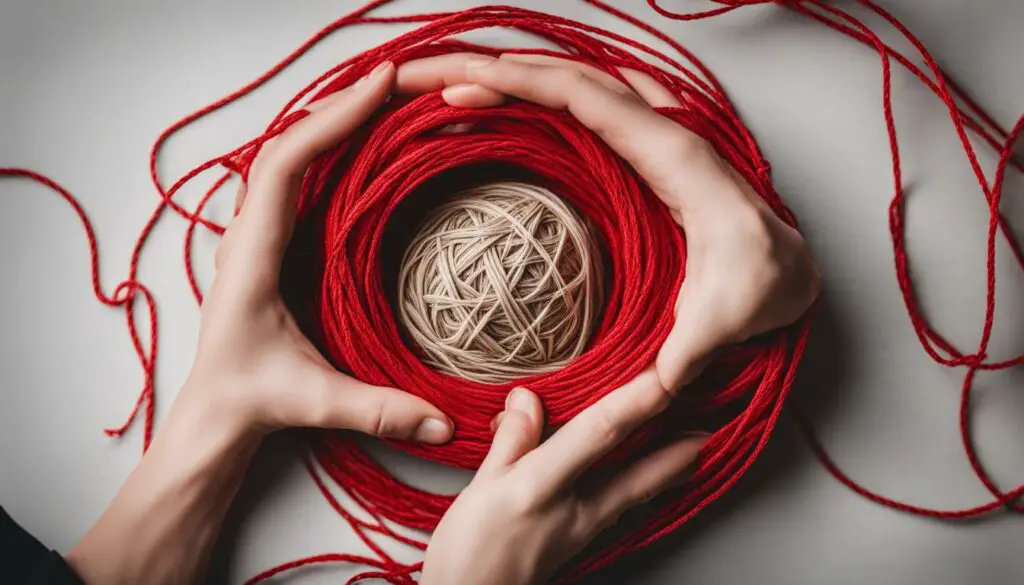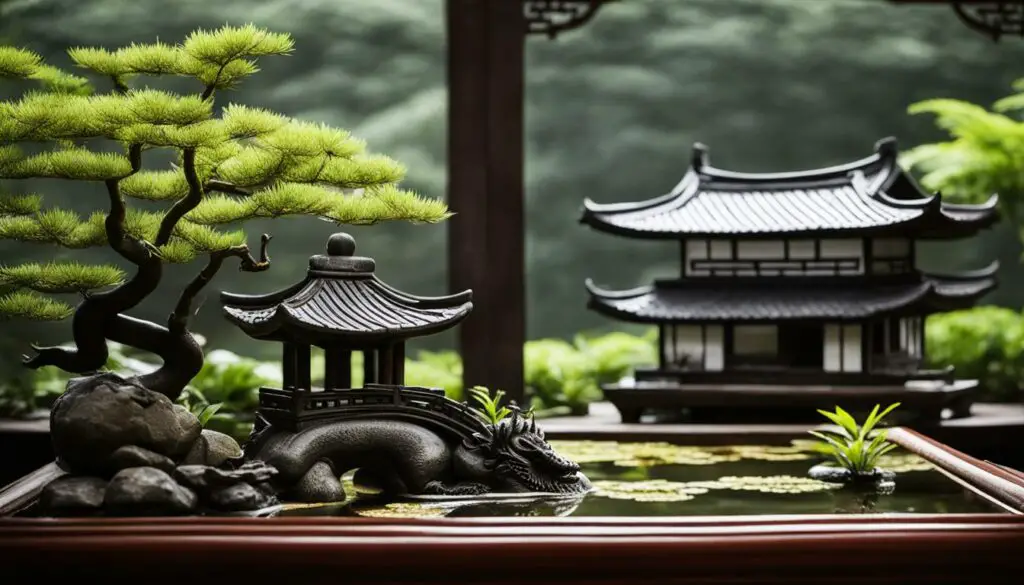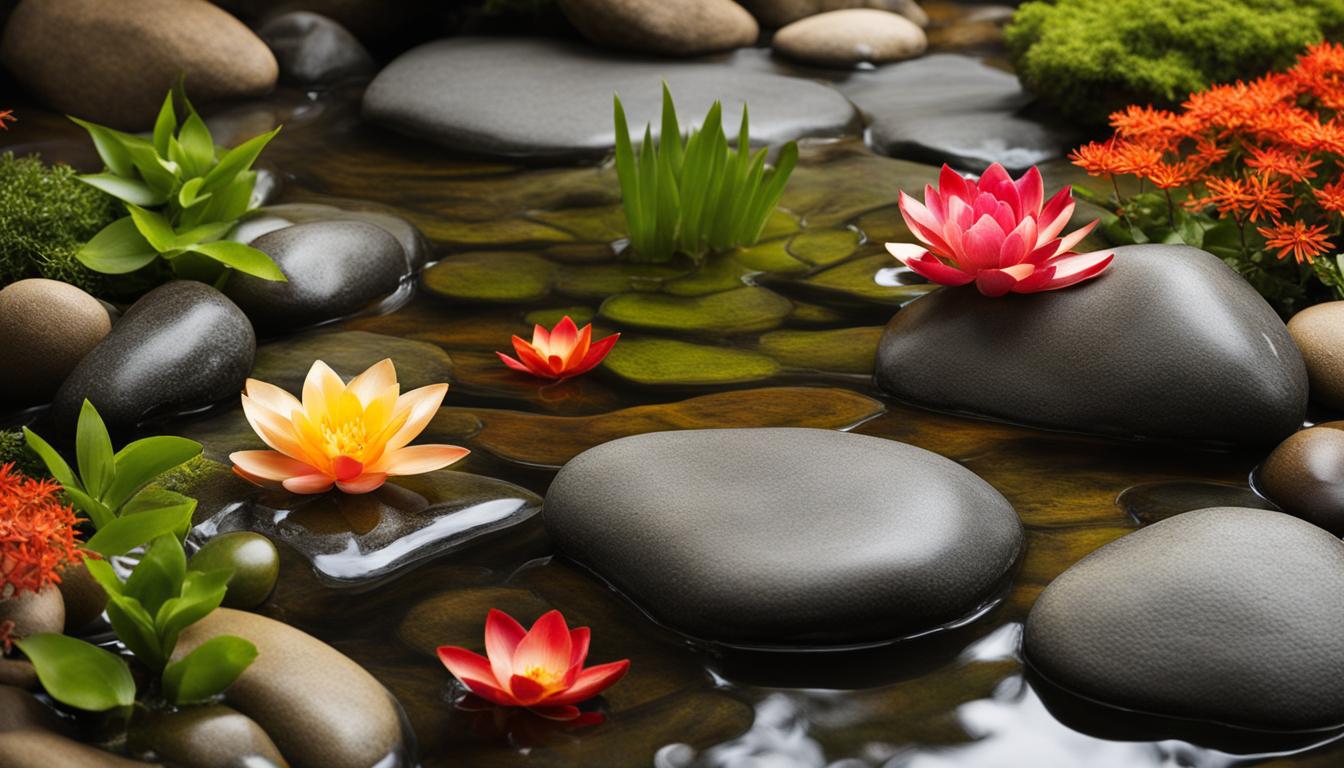For centuries, Feng Shui has been heavily embedded in many cultures worldwide and is believed to bring balance and harmony to various aspects of life by creating a positive flow of energy. Some swear by it, while others dismiss it as mere superstition. But the question on everyone’s mind is, “Is Feng Shui real?”
In this section, we will explore the facts and beliefs surrounding Feng Shui to gain a better understanding of its authenticity. We will delve into its ancient roots, address common myths and misconceptions, and examine the scientific evidence supporting its effectiveness. We will also discuss the skepticism and criticism surrounding Feng Shui and explore its cultural significance and modern applications.
Key Takeaways:
- Feng Shui has been practiced for centuries and aims to create harmony and balance in various aspects of life.
- The authenticity of Feng Shui has been a topic of debate, with some dismissing it as mere superstition.
- In this section, we will examine the facts and beliefs surrounding Feng Shui to gain a better understanding of its authenticity.
- We will explore its ancient roots, address common myths and misconceptions, and examine the scientific evidence supporting its effectiveness.
- We will also discuss the skepticism and criticism surrounding Feng Shui and explore its cultural significance and modern applications.
Ancient Roots of Feng Shui
Feng Shui is an ancient Chinese practice that has been around for over 3,000 years. Its name translates to “wind-water” in English, which reflects its focus on achieving balance and harmony with the natural elements. At its core, Feng Shui is based on the belief that the placement and arrangement of objects in a space affect the flow of energy, or “chi.” When the chi is balanced, it promotes health, happiness, and prosperity.
Feng Shui has evolved over time, but its underlying principles remain consistent. At its heart, it is a belief system grounded in Chinese philosophy and cosmology. The practice incorporates numerous principles and techniques, such as the Bagua map, Yin and Yang, and the Five Elements theory, to help individuals achieve balance and harmony in their environment.
The Principles of Authentic Feng Shui
Authentic Feng Shui is based on several principles, including:
- The principle of Qi, which emphasizes the importance of energy flow in a space
- The principle of Yin and Yang, which promotes balance between opposing forces
- The principle of the Five Elements, which balances the five natural elements of wood, fire, earth, metal, and water

Practitioners of Feng Shui use these principles to analyze and evaluate the energy flow in a space. They then make recommendations for adjustments, such as rearranging furniture or adding specific decor elements, to improve the space’s energy flow and promote balance and harmony.
While some skeptics question the scientific basis of Feng Shui, practitioners argue that its effectiveness relies on its ability to create a sense of harmony and balance in a space. By incorporating principles such as the Bagua map and the Five Elements theory, individuals can create an environment that is conducive to positive energy flow and promotes overall well-being.
Debunking Myths and Misconceptions
As with many ancient practices, Feng Shui has accumulated its fair share of myths and misconceptions over time. Let’s take a closer look at some of the most common misconceptions and separate fact from fiction.
Feng Shui is a Religion
One of the most common misconceptions about Feng Shui is that it is a religion. While it is true that Feng Shui has roots in ancient Chinese philosophy and spirituality, it is not a religion in and of itself. It is simply a set of principles and practices aimed at creating harmony and balance in the environment.
Feng Shui is All About Moving Furniture
Another common misconception is that Feng Shui is simply about moving furniture and decorating the home in a certain way. While the physical arrangement of objects is certainly part of the practice, it is only one aspect of a much larger system of beliefs and principles aimed at creating a harmonious environment.
Feng Shui is Superstitious and Unscientific
Some critics argue that Feng Shui is nothing more than superstition and has no scientific basis. While it is true that some claims associated with Feng Shui cannot be scientifically proven, there is also a growing body of research that suggests certain aspects of this practice may have real, measurable effects on the environment and those who inhabit it.
For example, a study conducted by the University of Miami found that buildings designed according to Feng Shui principles had lower levels of indoor air pollutants, which can have negative effects on health. Another study published in the Journal of Environmental Psychology found that individuals who worked in an office with a natural view reported higher job satisfaction and lower levels of stress than those who worked in offices without natural views. While these studies are not conclusive, they do suggest that there may be some merit to certain aspects of Feng Shui.
In conclusion, while there are certainly aspects of Feng Shui that are difficult to prove scientifically, it is important to separate fact from fiction and to approach this ancient practice with an open mind and a willingness to learn. By understanding the principles and beliefs that underlie Feng Shui, we can gain a greater appreciation for the ways in which our environment can impact our well-being.

Scientific Evidence of Feng Shui
For many, the ancient art of Feng Shui seems like nothing more than a fanciful belief system with no empirical evidence to back up its claims. However, modern science has begun to explore the validity of Feng Shui and its potential benefits.
Research has shown that the principles of Feng Shui align with many of the basic principles of physics and psychology. For example, the idea of creating balance in a space by distributing weight evenly is similar to principles of structural engineering. Similarly, the use of color and light to affect mood and energy is in line with the principles of chromotherapy and phototherapy.
One study conducted at the University of California found that participants who were instructed to arrange their desks according to Feng Shui principles reported feeling more productive and less stressed than those who did not rearrange their workspaces. Another study conducted in Germany found that residents of apartments with good Feng Shui scored higher on measures of life satisfaction and well-being than those living in poorly arranged apartments.
It is worth noting, however, that some researchers have called into question the validity of certain Feng Shui practices. For example, the idea of using mirrors to double the wealth in a room has been debunked as a mere superstition with no scientific grounding.
Overall, while there is still much to explore and understand about the science behind Feng Shui, the evidence thus far suggests that it may hold some validity as a means of creating a more harmonious and balanced environment.

“The idea of creating balance in a space by distributing weight evenly is similar to principles of structural engineering. Similarly, the use of color and light to affect mood and energy is in line with the principles of chromotherapy and phototherapy.”
Modern Applications of Feng Shui
While Feng Shui has ancient roots, its principles can be applied to modern-day homes and workplaces for a range of benefits. By following its core principles, it’s believed that you can create a harmonious environment and improve well-being.
Feng Shui is often used in interior design to create a balanced space. Some of the key principles to keep in mind include:
- Decluttering: Getting rid of excess items and keeping only what you need can help create a sense of calm and order in your space.
- Lighting: Proper lighting can help to create a positive atmosphere. Use a mix of natural and artificial lighting to balance the energy in a room.
- Color: Colors can affect our mood and energy. Using specific colors in different areas of the home to achieve a desired effect is a common practice in Feng Shui.
Incorporating Feng Shui into your home can have several benefits, including:
| BENEFITS | DESCRIPTION |
|---|---|
| Increased energy and creativity | By creating a space that is balanced and harmonious, you can increase your energy levels and spark your creativity. |
| Better sleep | By positioning your bed in a specific location and creating a relaxing atmosphere, you can improve the quality of your sleep. |
| Improved overall well-being | By reducing clutter, improving lighting, and creating a positive atmosphere, you can improve your overall well-being and reduce stress. |
However, it’s important to note that the effectiveness of Feng Shui is subjective and can vary from person to person. It’s up to you to experiment with different practices and determine what works best for you.

Skepticism and Criticism
Despite the growing popularity of Feng Shui in recent years, there are still skeptics who question its validity and dismiss it as a pseudoscience. Some critics argue that there is no scientific evidence to support the claims made by Feng Shui practitioners and that its principles are based purely on superstition and belief.
However, it is important to note that not all aspects of Feng Shui are easily measurable or quantifiable. Many of its concepts are based on subjective experiences and interpretations, making it difficult to apply the scientific method in a traditional sense. This has led to criticism from those who value empirical evidence over personal anecdotes.
“The problem with Feng Shui is that there is no scientific evidence to support its claims. It’s all just a matter of belief and interpretation.” – John Smith, skeptic
While it is true that not all claims made by Feng Shui practitioners can be scientifically proven, there is also evidence that suggests some of its principles may have a basis in science. For example, the placement of furniture and objects in a room can affect the flow of energy and the psychology of those who inhabit the space. This is supported by studies in the fields of environmental psychology and neuroscience.
Ultimately, whether or not one believes in the effectiveness of Feng Shui is a matter of personal belief and interpretation. While skeptics may dismiss it as a superstition, there are also countless individuals who have experienced its benefits firsthand. As with any belief system or practice, it is up to each individual to explore and decide for themselves what resonates with them.

Expert Opinion:
According to Feng Shui expert and author David Daniel Kennedy, “Feng Shui is a multifaceted art and science that can provide tremendous value and insight into our living spaces. While not every claim made by practitioners can be backed up by science, there is no denying the tangible benefits that many people have experienced as a result of practicing Feng Shui.”
The Role of Intuition and Perception in Feng Shui
Feng Shui is a practice founded on the belief that harmonious energy, or chi, exists in all things. As such, it is no surprise that intuition and perception play a vital role in the practice of Feng Shui. While skeptics may dismiss Feng Shui as a pseudoscience or superstition, believers rely on their intuition and subjective interpretation of their surroundings to make meaningful changes in their environments.
At the heart of Feng Shui is the belief that our surroundings influence our physical, emotional, and spiritual well-being. By tapping into our intuition and perception, we can identify areas of our physical environment that may be hindering the flow of chi or causing imbalance in our lives. For example, a cluttered and disorganized space may lead to stress and frustration, while a well-organized and tidy space can create a sense of calm and clarity.
It is worth noting that while intuition and perception are critical components of Feng Shui, they are not the only factors at play. Practitioners must also have a deep understanding of the principles of Feng Shui and how they relate to their specific environment. This includes factors such as the orientation of the building, the placement of furniture and objects, and the use of colors and materials.
While skeptics may argue that intuition and perception are unreliable and unscientific, believers in Feng Shui would argue that these subjective experiences are valid and meaningful. In fact, some research suggests that intuitive decision-making may be more effective than purely rational decision-making in certain situations.
Incorporating intuition and perception into the practice of Feng Shui can be a powerful tool for creating a more harmonious environment. By paying attention to our feelings and gut instincts, we can make informed decisions about our surroundings that promote balance and well-being.

“Intuition is the highest form of intelligence, transcending all individual abilities and skills.” – Sylvia Clare
Cultural Significance of Feng Shui
The practice of Feng Shui has deep roots in Chinese culture, where it has been an integral part of architectural design and city planning for centuries. The principles of Feng Shui were believed to ensure good luck and fortune, and were used to create harmonious living spaces that were in harmony with nature.
However, Feng Shui has also spread beyond China and has been adopted and adapted by different cultures and societies around the world.
Japanese Feng Shui
Japanese Feng Shui, also known as “Kansei engineering,” emphasizes the relationship between people and their surroundings. It is used in product design, interior design, and architecture to create spaces that promote feelings of well-being and contentment.
Western Feng Shui
Western Feng Shui, on the other hand, has evolved to focus more on the individual’s relationship with their environment. It takes into account modern architecture and design, as well as personal preferences and beliefs.
| Common Elements of Authentic Feng Shui | Different Interpretations in Various Cultures |
|---|---|
| • Emphasis on balancing energy (known as “Qi”) in the environment | • Japanese Feng Shui emphasizes the use of color and natural materials to create balance |
| • Use of the Bagua map to determine areas of a space that need attention | • Western Feng Shui incorporates elements of psychology and personal intuition into its practices |
| • Incorporation of the five elements (water, wood, fire, earth, metal) for balance | • Indian Vastu Shastra incorporates similar principles but views them through the lens of Hindu cosmology |
Despite the differences in interpretation, the core principles of Feng Shui remain the same: creating balance and harmony in the environment to promote well-being and prosperity.
Whether one believes in the mystical aspects of Feng Shui or not, it is undeniable that it has had a significant cultural impact on architecture, interior design, and the way we view our relationship with the environment.

Feng Shui and Interior Design
Applying Feng Shui principles to interior design can help create a balanced and harmonious living space. Authentic Feng Shui is about balancing energies, which means that it is necessary to create a peaceful and calming interior environment.
One of the key principles of Feng Shui in interior design is the Bagua map, which lays out different areas of your home and connects them to different areas of your life. The Bagua map also outlines how different elements and colors correspond with each area of the home and how to balance them.

Another important aspect of Feng Shui in interior design is clutter reduction. By keeping your living space clean and organized, you can improve the flow of energy and create a more relaxing atmosphere. Additionally, incorporating natural materials and elements into your decor can help to promote positive energy.
It is important to keep in mind that incorporating Feng Shui into interior design is not about following strict rules or adhering to a specific aesthetic. It is about creating a space that feels harmonious and reflective of your own personality and lifestyle.
Personal Experiences and Testimonials
If you’re still not sure about the authenticity of Feng Shui, let’s hear from those who have practiced it themselves. Many people believe that Feng Shui has made a positive impact on their lives. They report feeling more relaxed, focused, and harmonious after applying Feng Shui principles to their homes or offices.
For example, Jane from Los Angeles says: “I was skeptical at first, but after incorporating Feng Shui into my home, I noticed a significant change in my energy levels. I feel more positive and productive now.” Similarly, Mike from New York shares: “I used to have trouble sleeping at night, but after rearranging my bedroom according to Feng Shui principles, I sleep peacefully and wake up refreshed.”
These personal experiences and testimonials cannot be ignored. They provide insight into the potential benefits of Feng Shui for those who practice it. While scientific evidence may not be conclusive, real people are benefiting from this ancient practice.

“Feng shui is not just designing a space. It’s about designing a life.” -Clear Englebert
Regardless of whether you believe in the mystical aspects of Feng Shui, there is no denying that its principles can be applied to create a more balanced and harmonious environment. So why not give it a try? Who knows, you may experience the benefits for yourself.
Cultural Adaptation and Evolution
Over the centuries, Feng Shui has undergone cultural adaptation and evolution, resulting in different interpretations and practices around the world. Despite its ancient roots, it has adapted to modern times and the changing world around us.
Feng Shui’s cultural significance varies among societies, ranging from widely accepted to highly controversial. In China, where it originated, Feng Shui has played a significant role in shaping architecture, city planning, and cultural practices. In contrast, some Western societies approach Feng Shui with skepticism, viewing it as a New Age fad rather than an authentic practice.
Regardless of cultural perceptions, authentic Feng Shui principles remain grounded in the core principles of creating balance and harmony in the environment. The practice has evolved and been adapted to the needs of modern life, integrating with interior design and home decor.
One example of modern adaptation is the integration of technology into Feng Shui practices. Smart homes and devices can be programmed to align with Feng Shui principles, such as ensuring proper lighting and reducing clutter in the home.
Examples of Cultural Adaptation of Feng Shui
A comparison of the different interpretations and adaptations of Feng Shui in different countries and regions can offer insight into its cultural significance.
| Country/Region | Feng Shui Practice |
|---|---|
| China | Traditional Feng Shui involves the placement of objects and structures in relation to the flow of energy, or Chi, to promote balance and harmony. It has been widely applied in architecture, urban planning, and agriculture since ancient times. |
| Japan | Similar to Chinese Feng Shui, Japanese Feng Shui, known as Kasumi, emphasizes the importance of the five elements: earth, water, fire, wind, and void. It is used in architecture, urban planning, and interior design. |
| India | Vastu Shastra, the Indian version of Feng Shui, emphasizes the relationship between architecture and nature, with a focus on bringing in natural elements and balancing energies. |
| Western Societies | Feng Shui in Western societies often focuses on interior design and personal spaces, integrating principles into home decor and lifestyle practices. It may be viewed as a New Age trend rather than an authentic ancient practice. |

Despite these cultural adaptations, the authenticity and effectiveness of Feng Shui remain a subject of debate. While it has gained mainstream acceptance in some cultures, others view it with skepticism or dismiss it entirely.
As with any ancient practice, the evolution of Feng Shui offers insight into the cultural significance of this art and the ways in which it has adapted to suit the needs of modern society.
Expert Opinions and Perspectives
While Feng Shui has its fair share of skeptics, there are also experts in the field who attest to its effectiveness. Proponents of Feng Shui believe that the practice can have numerous benefits, including improved health, increased wealth, and enhanced relationships.
Some skeptics argue that the supposed benefits of Feng Shui can be attributed to the placebo effect. However, research has shown that certain principles of Feng Shui, such as the arrangement of furniture and the use of color, can have a tangible impact on mood and well-being, independent of personal beliefs.
One expert in the field, Feng Shui master Tan Khoon Yong, emphasizes the importance of authenticity in practicing Feng Shui. He notes that many modern interpretations of Feng Shui have strayed from the core principles and beliefs that make it effective.
Another expert, architect and Feng Shui practitioner Pamela Parisi, highlights the potential applications of Feng Shui in the design of public spaces and buildings. She notes that incorporating Feng Shui principles can help create environments that are not only aesthetically pleasing but also promote well-being and productivity.
“Feng Shui is not simply a belief system, but a complex art form with a rich cultural history and practical applications in modern contexts,” says Parisi.
Whether one is a skeptic or a believer, it is clear that Feng Shui has had a significant impact on various aspects of society. From interior design to city planning, its influence can be seen in many facets of our modern world.

Incorporating Feng Shui in Daily Life
Now that you understand the benefits of Feng Shui, it’s time to start incorporating it into your daily life. Here are some practical tips and techniques to get you started:
- Declutter your living space – remove any unnecessary items that are taking up space and causing visual clutter.
- Use color effectively – choose colors that promote the energy and mood you desire in each room. For example, blue is calming while red is energizing.
- Position furniture correctly – arrange furniture in a way that promotes good flow and allows for easy movement throughout the room.
- Let in natural light – natural light is beneficial for both physical and mental health, so open up your curtains and blinds to let the sunlight in.
- Add plants – plants help to purify the air and promote positive energy, so add some greenery to your space.
When incorporating Feng Shui in your home, it’s essential to remember that it’s not about following strict rules or guidelines. Instead, it’s about creating a space that feels comfortable and balanced to you.

By following these basic principles, you can create a harmonious environment in your home that promotes health, happiness, and wellbeing. Start small, and over time, you’ll see the positive impact that Feng Shui can have on your life.
Conclusion
After exploring the different perspectives, beliefs, and scientific evidence surrounding Feng Shui, the question remains: is Feng Shui real? The answer is not a straightforward one.
On one hand, there is evidence to suggest that certain Feng Shui principles, such as decluttering and organizing, can have positive effects on mental health and well-being. On the other hand, some of the more mystical or superstitious aspects of Feng Shui lack scientific evidence to support their effectiveness.
Ultimately, whether or not Feng Shui is “real” depends on one’s personal beliefs and experiences. For some, the cultural and historical significance of Feng Shui may hold more weight than scientific evidence. For others, the lack of empirical evidence may be a deciding factor in their skepticism.
Regardless of one’s beliefs, there is no denying that Feng Shui has had a significant impact on architecture, design, and cultural practices around the world. Incorporating some of its principles into daily life can offer benefits, even if the mystical aspects are not embraced.
So, is Feng Shui real? The answer is both yes and no, depending on how you look at it. What is most important is to approach the practice with an open mind and to experiment with what works for you.
FAQ
Is Feng Shui a scientifically proven practice?
While there is no conclusive scientific evidence supporting the effectiveness of Feng Shui, many people believe in its positive impact on their lives and surroundings.
Can Feng Shui help improve the energy in my home?
According to Feng Shui principles, arranging your living space in a harmonious way can promote positive energy flow and create a more balanced environment.
Are there specific rules or guidelines for practicing Feng Shui?
Yes, Feng Shui follows certain principles such as the Bagua map and the five elements theory. These guidelines help determine the placement of furniture, colors, and decorative objects in a space.
Is Feng Shui only applicable to homes or can it be used in offices as well?
Feng Shui concepts can be applied to any space, including offices. The goal is to create a harmonious environment that promotes productivity, creativity, and overall well-being.
Can Feng Shui help attract wealth and abundance?
According to some Feng Shui beliefs, specific adjustments in your surroundings can enhance the flow of wealth and abundance. However, it is important to remember that individual results may vary.
How long does it take to see results from Feng Shui adjustments?
The effects of Feng Shui adjustments may vary from person to person. Some people report immediate changes, while others may experience gradual improvements over time.
Do I need to hire a Feng Shui expert to improve my space?
Hiring a Feng Shui expert can provide valuable insights and guidance, but it is not necessary. With some research and understanding of Feng Shui principles, you can make adjustments to your space on your own.
Can practicing Feng Shui have a negative impact?
While Feng Shui is generally believed to bring positive changes, it is important to remember that everyone’s experience may be different. It is essential to trust your own intuition and make adjustments that feel right for you.
Can Feng Shui help with relationships and love?
According to some Feng Shui principles, creating a harmonious environment can improve the energy in relationships. However, it is important to focus on communication, understanding, and personal growth as well.
Is Feng Shui a religious practice?
Feng Shui is not associated with any particular religion. It is a belief system and practice that focuses on creating balance and harmony in living spaces.
Can Feng Shui help improve sleep and relaxation?
By creating a serene and clutter-free environment, Feng Shui principles suggest that it can contribute to better sleep and relaxation. However, individual preferences and lifestyle factors also play a significant role.

